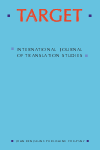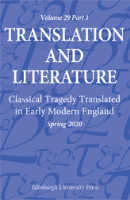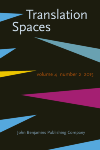
Target-International Journal of Translation Studies
Scope & Guideline
Fostering Dialogue in Linguistic Research
Introduction
Aims and Scopes
- Interdisciplinary Approaches to Translation:
The journal explores translation from various disciplines, including linguistics, literature, cultural studies, and technology, fostering a comprehensive understanding of translation practices. - Focus on Audiovisual Translation (AVT):
A significant portion of publications addresses the nuances of audiovisual translation, including subtitling, dubbing, and the impact of streaming platforms on translation practices. - Cultural and Political Contexts of Translation:
Research often highlights the cultural and political implications of translation, examining how translations influence and reflect societal norms and values. - Technological Integration in Translation:
The journal investigates the interplay between technology and translation, including machine translation, data literacy, and the use of digital tools for enhancing translation quality. - Translation Education and Training:
Contributions focus on pedagogical approaches to translator training, exploring competencies required for effective translation and interpreting in various contexts.
Trending and Emerging
- Translanguaging and Multimodal Translation:
There is a growing focus on translanguaging practices and multimodal approaches to translation, emphasizing the blending of languages and media in translation processes. - Impact of Streaming and Digital Media on Translation:
Research examining the implications of streaming services and digital media on translation practices has surged, highlighting how technology reshapes audience reception and translator workflows. - Cognitive and Psychological Aspects of Translation:
Emerging studies on the cognitive processes involved in translation and interpreting are gaining traction, offering insights into how translators think and make decisions during their work. - Social Justice and Activism in Translation:
There is an increasing emphasis on social justice themes, including translation's role in activism and representation of marginalized voices, particularly within the context of queer and diasporic communities. - Data-Driven Translation Research:
The integration of statistical and data-driven methodologies in translation studies is becoming more prevalent, reflecting a trend towards empirical research and quantifiable analysis.
Declining or Waning
- Traditional Literary Translation:
Research centered on classic literary translation techniques is less frequently published, suggesting a movement towards more contemporary and innovative translation practices. - Legal Translation Studies:
While still relevant, the volume of articles focusing specifically on legal translation has diminished, reflecting a broader trend towards interdisciplinary approaches rather than niche legal contexts. - Historical Perspectives on Translation:
There appears to be a waning interest in historical analyses of translation practices, as newer research tends to prioritize current trends and technologies over historical frameworks. - Translation Norms and Fidelity Debates:
The discussions surrounding fidelity and norms in translation seem to be less emphasized, as scholars increasingly explore dynamic and context-sensitive approaches to translation.
Similar Journals

Quaderns-Revista de Traduccio
Unveiling the Art of Translation ExcellenceQuaderns-Revista de Traduccio, published by the Universitat Autònoma de Barcelona, is a prominent journal in the field of Linguistics and Language, which has garnered recognition for its scholarly contributions since its inception. With an ISSN of 1138-5790 and an E-ISSN of 2014-9735, this journal has maintained an active publication schedule across notable cycles, contributing valuable insights from 2011 to 2018 and continuing from 2020 to 2024. As a Q3 category journal in both Arts and Humanities and Social Sciences related to Language and Linguistics, it occupies an important niche, ranking #607 out of 1088 and #692 out of 1167 respectively. Though currently not an open-access journal, its rigorous peer-review process ensures that published articles meet high academic standards, making them relevant for researchers, professionals, and students alike. Housed in Cerdanyola del Vallès, Barcelona, this journal serves as a critical platform for the dissemination of cutting-edge translation studies and linguistics research.

Eurasian Journal of Applied Linguistics
Innovating Language Education Across EurasiaThe Eurasian Journal of Applied Linguistics, published by Hacettepe University, ELT Department, is a distinguished open-access journal that has been contributing to the fields of linguistics and language education since 2015. With a focus on bridging cultural and linguistic understandings across Eurasia, this journal provides a platform for researchers, educators, and practitioners to share cutting-edge studies, innovative pedagogical strategies, and insightful analyses. The journal holds notable Scopus rankings within the Language and Linguistics (Rank #155/1088, 85th Percentile) and Education (Rank #696/1543, 54th Percentile) categories, evidencing its growing impact within the academic community. As it prepares to converge into a new phase from 2018 to 2024, the Eurasian Journal of Applied Linguistics aims to uphold its mission of fostering interdisciplinary dialogue and advancing knowledge in applied linguistics and its related fields.

Current Trends in Translation Teaching and Learning E
Advancing the Art of Translation EducationCurrent Trends in Translation Teaching and Learning E is a premier open access journal published by UNIV HELSINKI, DEPT MODERN LANGUAGES, dedicated to advancing the field of translation studies. With an ISSN of 2342-7205, this journal has been providing a crucial platform for researchers, educators, and practitioners since 2010. The journal focuses on the latest methodologies, pedagogical innovations, and theoretical discussions related to translation and language education, making it an essential resource for professionals and students alike. By fostering an environment of open knowledge exchange, Current Trends in Translation Teaching and Learning E significantly contributes to the intellectual discourse in this vital field, ensuring that contemporary practices keep pace with the evolving landscape of global communication. The journal is poised to maintain its relevance and impact, providing a rich repository of research that reflects the dynamic and diverse nature of translation today.

Tradumatica-Traduccio i Tecnologies de la Informacio i la Comunicacio
Advancing Translation Studies in the Digital EraTradumatica-Traduccio i Tecnologies de la Informacio i la Comunicacio, published by the Universitat Autònoma de Barcelona, is a prestigious open-access journal that has established itself as a leading platform in the fields of Linguistics, Literature, and Communication Technologies since its inception in 2010. With its recent classification in the Q1 category of both Linguistics and Literary Theory, and an impressive 97th percentile ranking in Literature and Literary Theory on Scopus, this journal is recognized for its contribution to high-quality scholarly research. The journal serves as a vital resource for researchers, professionals, and students who are engaged in the dynamic intersection of translation studies and technology. Music its comprehensive coverage from 2019 to 2023, it aims to foster dialogues and advancements in translation methodologies and practices, making it indispensable for those looking to remain at the forefront of innovations in the field. Located in vibrant Barcelona, Spain, the journal provides an invaluable avenue for disseminating influential research while promoting an international scholarly community.

Translation and Literature
Innovating Perspectives on Translation and TextsTranslation and Literature is a leading academic journal published by Edinburgh University Press, focusing on the intricate relationship between language and literature within the realms of translation studies. With an ISSN of 0968-1361 and an E-ISSN of 1750-0214, this journal provides a crucial platform for scholars and practitioners to explore and disseminate research that addresses both the theoretical and practical aspects of translation. Since its inception in 1996, Translation and Literature has established itself as an essential resource, particularly noted for its contributions to the fields of linguistics and literary theory, as indicated by its Q4 ranking in both categories in 2023. The journal's articles are designed to foster dialogue across disciplines, encouraging innovative thinking and collaboration among researchers, professionals, and students alike. Access to this valuable resource is currently available through subscription, ensuring high-quality scholarship reaches a diverse audience dedicated to advancing the understanding of translation's role in literature.

Bible Translator
Connecting Scholars, Translators, and Educators in Biblical StudiesThe Bible Translator is a distinguished journal dedicated to the scholarly exploration and analysis of biblical translations and their impact across cultures and traditions. Published by SAGE Publications Ltd, this journal seeks to bridge the gap between theology, linguistics, and intercultural communication, providing an essential platform for researchers, translators, and educators alike. With an ISSN of 2051-6770 and an E-ISSN of 2051-6789, it ensures broad accessibility to its readership. Although it currently does not operate under an Open Access model, the journal's rigorous peer-review process and commitment to high-quality research make it a vital resource for professionals and students in the fields of religious studies and translation theory. Contributing to the ongoing discourse around scriptural texts, The Bible Translator remains pivotal in fostering understanding and appreciation of the intricacies involved in translating sacred writings, thereby reinforcing its importance in both academic and applied contexts.

Estudios de Traduccion
Exploring the dynamic landscape of translation research.Estudios de Traduccion is a distinguished academic journal published by UNIV COMPLUTENSE MADRID, SERVICIO PUBLICACIONES, dedicated to advancing the field of translation studies. Since its establishment, the journal has embraced an Open Access model, providing researchers, professionals, and students with free and unrestricted access to high-quality scholarly articles since 2011. With the ISSN 2174-047X and E-ISSN 2254-1756, it serves as a vital resource for those interested in innovative methodologies, theoretical advancements, and practical applications within translation. By championing interdisciplinary research and fostering dialogue among scholars from diverse backgrounds, Estudios de Traduccion plays a crucial role in shaping the understanding of translation as a dynamic and evolving discipline. As a reputable platform, it invites contributions that stimulate critical thought and inspire future research in this essential area of communication.

Perspectives-Studies in Translation Theory and Practice
Unveiling New Perspectives in Translation StudiesPerspectives-Studies in Translation Theory and Practice, a leading journal published by Routledge Journals, Taylor & Francis Ltd, serves as a pivotal platform for the exploration of translation studies, fostering dialogue among researchers, professionals, and students in the fields of cultural studies, linguistics, and literature. Established in 1996, this esteemed journal has consistently maintained its position within the Q1 quartile in both cultural studies and linguistics, thanks to its rigorous peer-review process and dedication to high-quality scholarship. With an impressive ranking of 6th out of 1106 in Arts and Humanities Literature and Literary Theory on Scopus, Perspectives stands out as a vital resource for those seeking to enrich their understanding and engage with evolving translation theories and practices. The journal is not open access, yet it remains influential in shaping discourse and advancing knowledge within its dynamic and interdisciplinary field. Researchers and students alike will find valuable insights in its contributions, making it an essential addition to any academic library.

Translation Spaces
Innovating Perspectives on Language and LiteratureTranslation Spaces is a premier academic journal dedicated to the interdisciplinary study of translation and its implications across various fields, including communication, linguistics, and literature. Published by John Benjamins Publishing Company, this journal is based in the Netherlands and boasts an impressive impact factor, reflecting its significance in the scholarly landscape, particularly within Q1 quartiles for Communication, Linguistics and Language, and Literature and Literary Theory as of 2023. Recognized for its commitment to advancing knowledge, Translation Spaces provides an essential platform for researchers, educators, and practitioners to explore innovative theoretical perspectives and empirical findings. With a comprehensive scope that spans from 2016 to 2024, the journal is indexed in Scopus, securing high ranks in both Arts and Humanities and Social Sciences, offering a 99th percentile rank in Literature and Literary Theory and maintaining a strong presence in Linguistics and Language. The absence of open access options ensures that the quality and integrity of published research are upheld, making it a valuable resource for the academic community engaged in translation studies.

Cadernos de Traducao
Connecting researchers through rigorous peer-reviewed studies.Cadernos de Tradução, published by the Universidade Federal de Santa Catarina, is an esteemed open-access journal dedicated to fostering scholarship in the fields of Language, Linguistics, and Literature. Since its inception in 1996, this journal has emerged as a vital platform for research, particularly known for its rigorous peer-review process and commitment to academic excellence. With a Q2 ranking in Linguistics and Language and a Q1 ranking in Literature and Literary Theory as of 2023, it stands out in the global academic landscape, holding significant positions in Scopus rankings across various categories. Researchers, professionals, and students will find a wealth of interdisciplinary studies that contribute to current discussions and advancements in translation theory and practice. The journal's open-access model enhances visibility, ensuring that groundbreaking research is accessible to a wide audience, thus promoting dialogue and collaboration within the international academic community.